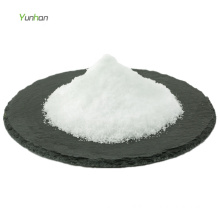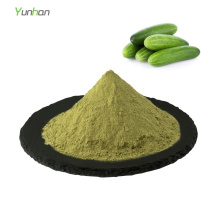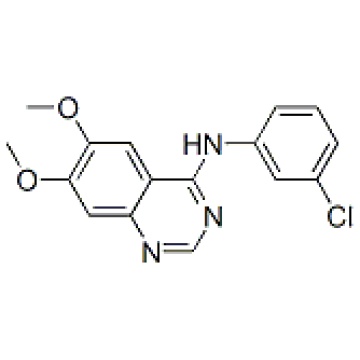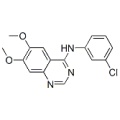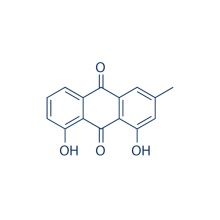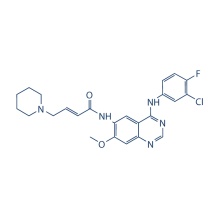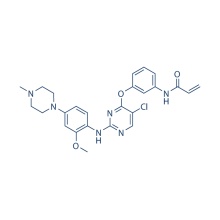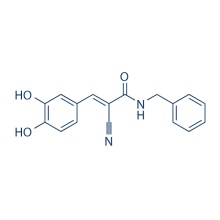AG-1478 (Tyrphostin AG-1478) 153436-53-4
Product Description
Molecular Weight:
315.75 AG-1478 (Tyrphostin AG-1478) is a selective EGFR Inhibitor with IC50 of 3 nM, almost no activity on HER2-Neu, PDGFR, Trk, Bcr-Abl and InsR.
Biological Activity
AG-1478 is high selective over ErbB2 and PDGFR with IC50 of >100 μM. AG-1478 preferentially inhibits U87MG cells expressing truncated EGFR
with IC50 of 8.7 μM, compared to those expressing endogenous wt EGFR or
overexpressing exogenous wt EGFR with IC50 of 34.6 μM and 48.4 μM,
respectively, and inhibits the DNA synthesis with IC50 of 4.6 μM, 19.67
μM, and 35.2 μM, respectively. AG-1478 also preferentially inhibits the
tyrosine kinase activity and autophosphorylation of the ΔEGFR compared
to endogenous or overexpressed exogenous wt EGFR.
AG-1478
(0.25 μM) abolishes the MAPK activation induced by Ang II, a Ca2+
ionophore as well as EGF but not by a phorbol ester or platelet-derived
growth factor-BB in the VSMC. AG-1478 inhibits EGF-induced mitogenesis of the BaF/ERX and LIM1215 cells with IC50 of 0.07 μM and 0.2 μM, respectively.
AG1478 is able to inhibit the function of ATP-binding cassette (ABC)
transporters such as ABCB1 and ABCG2, with a more pronounced effect on
ABCG2.
Administration of AG-1478 blocks phosphorylation of the EGFR at the
tumor site and inhibits the growth of A431 xenografts that overexpress
the WT EGFR and glioma xenografts expressing the de2-7 EGFR. Even
subtherapeutic doses of AG-1478 significantly enhance the efficacy of
cytotoxic drugs, with the combination of AG-1478 and temozolomide
displaying synergistic antitumor activity against human glioma
xenografts.
The combination of AG-1478 and an anti-EGFR antibody (mAb
806) displays additive and in some cases synergistic, antitumor activity
against tumor xenografts overexpressing the EGFR. The combination of AG-1478 (0.4 mg) with a single dose of 25 μCi 90Y-CHX-A''-DTPA-hu3S193 results in a significant enhancement of efficacy compared with either agent alone.
Protocol(Only for Reference)
Cell Assay:
[2]
| Cell lines | U87MG |
|---|---|
| Concentrations | Dissolved in DMSO, final concentrations ~100 μM |
| Incubation Time | 72 hours |
| Method | Cells are exposed to different concentrations of AG-1478 for 72 hours in 96-well plates. The effects of AG-1478 on cell growth are examined using an Alamar Blue assay. A 20-μL aliquot of Alamar Blue is added to each well, and its absorbance is determined using a Spectromax Scanning Micro plate Reader. The effects of AG-1478 are expressed as percentage of growth inhibition using untreated cells as the control (0% inhibition). Cellular DNA synthesis is determined using a [3H]thymidine incorporation assay. |
Animal Study:
[4]
| Animal Models | Female BALB/c nu/nu mice inoculated s.c. with A431 or U87MG.Δ2-7 tumor cells | ||
|---|---|---|---|
| Formulation | Dissolved in 100 mM Captisol | ||
| Dosages | ~1 mg/kg | ||
| Administration | Injection i.p. three times per week | ||
| Solubility | 15% Captisol, 30 mg/mL | ||
| * Please note that Selleck tests the solubility of all compounds in-house, and the actual solubility may differ slightly from published values. This is normal and is due to slight batch-to-batch variations. | |||
Conversion of different model animals based on BSA (Value based on data from FDA Draft Guidelines)
| Species | Baboon | Dog | Monkey | Rabbit | Guinea pig | Rat | Hamster | Mouse |
| Weight (kg) | 12 | 10 | 3 | 1.8 | 0.4 | 0.15 | 0.08 | 0.02 |
| Body Surface Area (m2) | 0.6 | 0.5 | 0.24 | 0.15 | 0.05 | 0.025 | 0.02 | 0.007 |
| Km factor | 20 | 20 | 12 | 12 | 8 | 6 | 5 | 3 |
| Animal A (mg/kg) = Animal B (mg/kg) multiplied by | Animal B Km |
| Animal A Km |
For example, to modify the dose of resveratrol used for a mouse (22.4 mg/kg) to a dose based on the BSA for a rat, multiply 22.4 mg/kg by the Km factor for a mouse and then divide by the Km factor for a rat. This calculation results in a rat equivalent dose for resveratrol of 11.2 mg/kg.
| Rat dose (mg/kg) = mouse dose (22.4 mg/kg) × | mouse Km(3) | = 11.2 mg/kg |
| rat Km(6) |
Chemical Information
| Molecular Weight (MW) | 315.75 |
|---|---|
| Formula | C16H14ClN3O2 |
| CAS No. | 153436-53-4 |
| Storage | 3 years -20℃Powder |
|---|---|
| 6 months-80℃in solvent (DMSO, water, etc.) | |
| Synonyms | NSC 693255 |
| Solubility (25°C) * | In vitro | DMSO | 25 mg/mL (79.17 mM) |
|---|---|---|---|
| Water | <1 mg/mL ( | ||
| Ethanol | 13 mg/mL (41.17 mM) | ||
| In vivo | 15% Captisol | 30 mg/mL | |
| * <1 mg/ml means slightly soluble or insoluble. * Please note that Selleck tests the solubility of all compounds in-house, and the actual solubility may differ slightly from published values. This is normal and is due to slight batch-to-batch variations. | |||
| Chemical Name | N-(3-chlorophenyl)-6,7-dimethoxyquinazolin-4-amine |
|---|
Molarity Calculator
Dilution Calculator
Molecular Weight Calculator
Contact us if you need more details on 153436-53-4. We are ready to answer your questions on packaging, logistics, certification or any other aspects about AG-1478 153436-53-4、Tyrphostin AG-1478 153436-53-4. If these products fail to match your need, please contact us and we would like to provide relevant information.
Product Categories : Protein Tyrosine Kinase > EGFR Inhibitor
